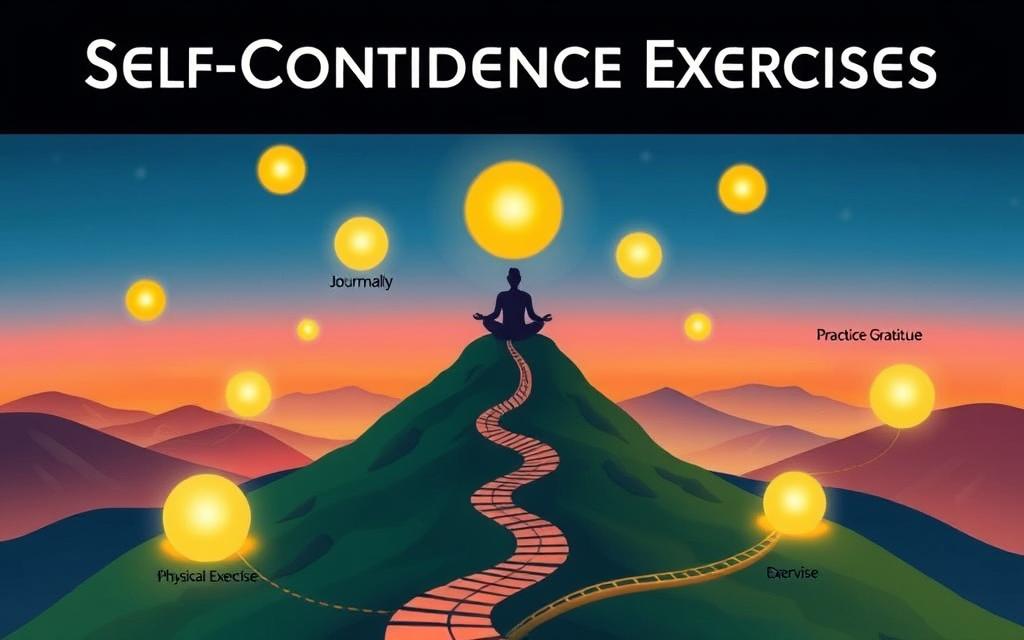Ever felt stuck, doubting your skills and hesitant to try new things? You’re not alone. Many of us have hit those self-doubt walls that block our growth. But, what if I said the secret to true self-assurance is in your mindset?
I’ve been on a journey of personal growth and building confidence. It’s been a rollercoaster of ups and downs, but the rewards are huge. You’ll feel strong and ready to face any challenge.
In this article, we’ll look at the basics of self-assurance and its psychology. We’ll also share practical tips to overcome mental blocks and grow. This journey is for anyone looking to reach their full potential.
So, let’s start this journey together. We’ll discover the power of self-assurance. Get ready to find your strengths, face your fears, and gain confidence for the life you dream of.
Understanding the Foundation of Self Assurance
Self-assurance is key to growing personally and building confidence. It starts with loving and respecting ourselves. It also means knowing our strengths and weaknesses and being open to learning from our experiences.
Defining Self Confidence vs. Self Esteem
Self-confidence and self-esteem are closely linked but different. Self-confidence is believing in our abilities and facing challenges. Self-esteem is how much we value ourselves and accept ourselves as we are.
The Psychology Behind Self Assurance
Understanding self-assurance means recognizing our strengths and being honest about our weaknesses. It’s about seeing challenges as chances to learn and grow, not as threats. By learning from our experiences and always trying to get better, we build a strong sense of self-assurance.
Core Elements of Personal Growth
- Embracing Challenges: Stepping out of our comfort zones and tackling difficulties head-on is essential for personal growth and self-assurance.
- Cultivating Resilience: Developing the ability to bounce back from setbacks and use them as stepping stones for improvement is a key aspect of self-assurance.
- Continuous Learning: Maintaining a curious and adaptable mindset, and constantly seeking opportunities to expand our knowledge and skills, contributes to a strong sense of self-assurance.
By understanding the foundation of self-assurance and the psychology behind it, we can start a journey of self-esteem growth, confidence building, and personal development.
Identifying Your Current Mindset Patterns
Recognizing your current mindset patterns is key to personal growth. Self-awareness helps you see how your thoughts and beliefs affect your actions. By looking at your mindset reprogramming, you can start to change negative beliefs that hold you back.
Many people face self-doubt and negative self-talk. These limiting beliefs come from past experiences or society. But, you can change them with effort and a positive mindset.

To start changing your mindset, think about your thoughts and actions. Ask yourself:
- Do you see challenges as obstacles or chances to grow?
- How do you react to feedback or criticism?
- Do you think your abilities and talents can change, or are they fixed?
Answering these questions honestly can help you understand your mindset patterns. This self-awareness is the first step to positive change and a more self-assured and growth-oriented mindset.
The Power of Self Assurance Mindset Development
Building a self-assured mindset means overcoming mental blocks, growing inner strength, and becoming resilient. It often requires facing fears, getting comfortable with discomfort, and pushing through tough times. Many people who succeed say it’s because they keep pushing past what they think they can do and learn from both wins and losses.
Breaking Through Mental Barriers
The first step is to face and beat mental barriers. This means fighting negative thoughts, changing limiting beliefs, and stepping out of your comfort zone. Research shows that self-confidence positively correlates with a 37% increase in goal in the business leadership training industry.
Cultivating Inner Strength
Building inner strength is key for lasting self-assurance. This includes being kind to yourself, managing your emotions, and finding your purpose. Studies indicate that building self-assurance can lead to a 23% improvement in employee in the corporate training sector.
Building Resilience
Resilience is about bouncing back from hard times. By adopting a growth mindset and learning from failures, you can grow resilient. 64% of individuals who undergo mindset development programs report a decrease in stress levels in the workplace.
Self-assurance mindset development is a journey of self-discovery and growth. It’s about facing challenges and growing from them. By overcoming mental barriers, building inner strength, and becoming resilient, you can reach your full potential and succeed in life.
Overcoming Limiting Beliefs and Self-Doubt
Limiting beliefs and self-doubt can block your path to self-assurance. But, by facing these mental hurdles head-on, you can break free and reach your full potential. Start by identifying the beliefs that hold you back, like “I’m not good enough” or “It’s too late to start something new.”
After spotting these beliefs, challenge and change your thinking. Replace negative thoughts with positive, empowering ones. This mindset shift is key to building confidence and self-assurance.
Take small steps towards your fears to build momentum and fight self-doubt. Getting support from a mentor, coach, or friend can offer valuable advice and encouragement. Remember, focus on growth, not perfection, and celebrate your small victories.

By tackling and dismantling limiting beliefs, you open doors to growth, opportunity, and self-discovery. This journey is central to building self-assurance and overcoming self-doubt. The Empowered Evolution Guide offers insights and inspiration to help you unlock your true potential and build lasting confidence and authenticity.
Developing Positive Self-Talk Strategies
Your inner voice has a big impact on how you feel about yourself. By using positive self-talk, you can overcome self-doubt and reach your goals.
Creating Effective Affirmations
Affirmations are great for changing your mind and behavior. Make affirmations practice that match your dreams. Say them every day to fill your mind with positive thoughts.
Managing Internal Dialogue
Watch your thoughts like an outsider. Notice when they’re negative and change them to something better. Learning to do this takes time and effort.
Reframing Negative Thoughts
Stop yourself when you’re being too hard on yourself. Replace those thoughts with positive self-talk. This simple trick can make you more motivated and confident.
Your mind is a powerful tool for success. Use positive self-talk, affirmations practice, and internal dialogue management to reach your highest potential.
The Role of Personal Experiences in Building Confidence
Personal experiences are key in building confidence. Many people say challenges, failures, and successes help them grow. Trying new things, taking risks, and learning from all outcomes boost self assurance and a growth mindset.
Overcoming obstacles makes us more confident. Every time we try something new, we learn more about ourselves. These experiences teach us to be resilient, adaptable, and understand our strengths and weaknesses better.
- Positive life experiences lead to personal growth, more resilience, better relationships, improved mental health, and more fulfillment.
- Challenging times also shape us, teaching self-awareness, empathy, and what we value most.
- Dealing with tough times, like loss or career setbacks, helps us build confidence building strategies. This includes seeking support, taking care of ourselves, and learning from the experience.
By embracing both good and bad experiences, we can build confidence and grow. Reflecting on our experiences through journaling, getting professional help, and celebrating small wins can make us more self-assured and resilient.
Creating a Growth-Oriented Environment
Building self-assurance is more than just looking inward. It’s also about creating the right space for growth. Dr. Carol Dweck says how we see intelligence matters a lot. It affects our learning and success.
To grow, surround yourself with people who support you. Set clear boundaries and build habits that empower you. These steps help you overcome mental blocks, build inner strength, and become resilient. All these are key to feeling confident.
Surrounding Yourself with Support
The company you keep shapes your mindset. Look for people who encourage you to take risks and see failures as chances to learn. They should also celebrate your efforts and small victories. This supportive environment shows you that growth is always within reach.
Setting Boundaries for Success
Setting boundaries is crucial too. Learn to say “no” to things that waste your energy or don’t help you grow. By focusing on what’s important, you can build habits that boost your self-assurance.
Building Empowering Habits
Positive habits are the backbone of growth. This might include daily affirmations, journaling, exercise, or trying new things. These empowering habits will become a big part of your journey to self-assurance.
By making your environment supportive, setting boundaries, and building good habits, you can reach your full potential. You’ll be able to confidently move forward in your self-assurance journey.
Practical Exercises for Confidence Building
Building self-assurance takes regular practice. By doing confidence exercises, you can slowly boost your self-esteem. Activities like public speaking, learning new skills, and setting small goals are great. Also, taking time for self-reflection is key.
Studies show that confident people are more respected. Their opinions are valued more. Even just two minutes of high-power poses can boost confidence and lower stress.
Repeating positive affirmations can change your brain’s outlook. It leads to higher self-esteem over time. Also, making eye contact makes you more memorable and trustworthy.
Breaking down big goals into smaller steps helps avoid feeling overwhelmed. Celebrating small wins boosts confidence and momentum.
- Public speaking practice
- Trying new skills or hobbies
- Setting and achieving small, measurable goals
- Engaging in self-reflection exercises
- Adopting a positive body language and posture
By regularly practicing these confidence exercises, you can grow more confident and resilient. Remember, building confidence is a journey. With dedication and self-care, you can reach your full potential.

Embracing Challenges as Growth Opportunities
Developing a growth mindset is key for personal and professional growth. It means seeing challenges as chances to learn and get better, not as limits. By embracing challenges, people build resilience, adaptability, and a love for learning.
Learning from Setbacks
Those with a growth mindset see setbacks as learning chances, not failures. They’re open to trying new things, taking risks, and getting feedback. When faced with obstacles, they see them as steps towards growth.
Celebrating Small Wins
It’s important to celebrate small victories on the journey of challenge acceptance and learning from setbacks. Acknowledging progress boosts confidence and shows growth is possible. By celebrating small wins, people stay motivated to tackle bigger challenges.
The journey to self-assurance and growth is full of challenges. Yet, by seeing challenges as opportunities, learning from setbacks, and celebrating small wins, people can reach their full potential. They achieve remarkable personal and professional growth.
Maintaining Long-Term Self Assurance
Building consistent self-improvement and lasting confidence is a journey, not a quick fix. It takes ongoing effort and self-reflection. By regularly checking goals, facing new challenges, and seeking growth, you can keep your confidence high.
A study found that building confidence can take up to 35 years on average. This shows that confidence grows over time, not instantly. Many people say understanding themselves better has greatly boosted their confidence.
People’s paths to confidence vary, as shown in many stories. These tales range from creative work to specialized jobs. They show that confidence can grow in many ways. Things like family support, past experiences, and personal identity shape self-esteem.
To keep confidence strong, focus on growth, celebrate small victories, and learn from failures. Seeing challenges as chances for growth helps you stay strong and determined. This way, you can handle the ups and downs of your confidence journey.

In the end, keeping self-assurance means seeing it as a continuous journey, not a fixed point. By always exploring yourself, adapting to changes, and celebrating your achievements, you can build lasting confidence. This confidence is key to success in both personal and professional life.
Measuring Your Progress and Growth
Tracking your progress is key to growing your self-assurance. By setting goals and checking your progress, you stay motivated. This helps you make smart choices to move forward.
Setting Achievable Milestones
Setting SMART goals is crucial for tracking your progress. Break big goals into smaller steps. Give each step a realistic deadline. This keeps you moving and focused on your main goal.
Tracking Personal Development
Regularly checking your progress is vital for keeping your self-assurance strong. Use journals, spreadsheets, or apps to track your growth. Celebrate your wins and learn from failures. Adjust your path as needed to keep growing.
By measuring your growth and setting reachable goals, you stay driven. Remember, growth isn’t always straight. But with a growth mindset, you can face challenges with confidence.
Integrating Self-Care into Your Journey
Starting your journey to build self-assurance? Make sure to add self-care to your daily life. Self-care is key for keeping your mind and body healthy. It helps you grow in a balanced way, making sure you keep improving without burnout.
A Vagaro survey found that 75% of Americans think self-care lowers stress and boosts confidence. Seeing the value of self-care is the first step to a happier, more balanced life. Here are some ways to make self-care a part of your journey:
- Prioritize your mental health by trying meditation, mindfulness, and therapy. These can cut down anxiety and clear your mind.
- Maintain a healthy lifestyle by exercising, sleeping well, and eating right. These habits can lift your mood and energy.
- Nurture your creative side by doing hobbies or art that make you happy. Creativity can release emotions and improve your well-being.
- Set boundaries and practice self-compassion to avoid burnout. Make sure you don’t get too stressed with self-improvement.
- Spend quality time with loved ones to build strong bonds and make lasting memories. These are crucial for your emotional and social health.
Remember, self-care is personal. Create a plan that fits your needs and stressors. This way, you can keep a balanced and lasting path to self-assurance.

Conclusion
Building self-assurance is a journey that takes hard work, self-reflection, and effort. It starts with understanding what self-assurance is. Then, you need to overcome doubts, face challenges, and grow every day.
This journey shows the importance of effort, a growth mindset, and positive self-talk. By focusing on learning and growing, you become stronger and more adaptable. This helps you handle life’s ups and downs better.
There’s no one right way to find self-assurance. It’s about discovering your own strengths and goals. By taking care of yourself, celebrating small victories, and tracking your progress, you can keep feeling confident. This leads to a more rewarding and successful life.
